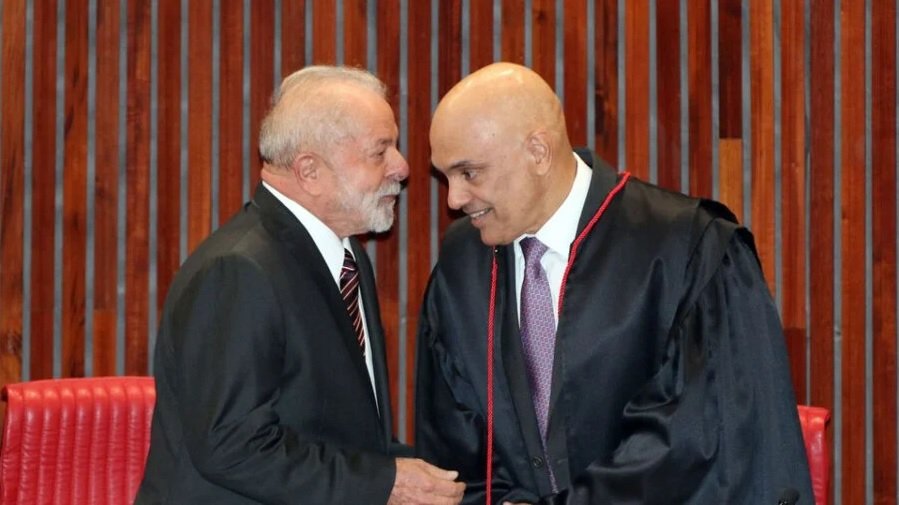Amid political challenges and efforts to maintain government stability, President Lula (PT) is navigating a series of sensitive issues ranging from the crisis in the Ministry of Communications to growing pressure surrounding the amnesty bill for those involved in the 8 January attacks. At the same time, Lula is engaging in public events in Rio de Janeiro focused on education and infrastructure as part of a broader strategy to regain public support. Meanwhile, the amnesty movement for those convicted of anti-democratic acts is gaining momentum in Congress—even among members of the president’s coalition—creating tension within the Planalto Palace and prompting reactions from the Federal Supreme Court. Justice Alexandre de Moraes, who is presiding over the cases related to the attempted coup, has been seeking institutional support amid political attacks, while allies of former President Jair Bolsonaro push for an expedited vote on the bill, despite the lack of consensus on its final text.
This Content Is Only For Subscribers
To unlock this content, subscribe to INTERLIRA Reports.
Ministry of Communications
Minister of Communications Juscelino Filho left the Lula (PT) government after being formally charged by the Attorney General’s Office (PGR) with passive corruption and other crimes related to the misuse of budget amendments. According to Secom (the Secretariat of Social Communication), Lula called him early in the afternoon and requested his resignation so that he could “focus on his defense.” Lula had previously stated that he would remove the minister if he were charged by the PGR. This marks the seventh ministerial dismissal during Lula’s third term, and the first tied to corruption allegations, although the accusations predate Juscelino’s entry into the Executive Branch.
New Minister
On Wednesday (09/04), President Lula’s administration confirmed Congressman Pedro Lucas Fernandes (União Brasil)—the party’s leader in the Chamber of Deputies—as the new Minister of Communications. The announcement came from the Minister of Institutional Relations, Gleisi Hoffmann. She stated that Fernandes requested to assume office only after Easter to handle party leadership matters and personal commitments. According to aides, Lula met Fernandes during an official trip to Asia last month and reportedly developed a favorable impression of the congressman.
Agenda in Rio
President Lula (PT) arrived in Rio de Janeiro on 14 April for a series of official engagements. His agenda in the state includes participating in the inauguration of a new Fluminense Federal University (UFF) campus and visiting a renovated stretch of the Presidente Dutra Highway, which traverses much of the state. These two events—focused on education and infrastructure—are seen as key by the Planalto Palace in efforts to rebuild Lula’s popularity, which has recently declined in several opinion polls.
Seeking Support
Amid the intensification of the movement for amnesty for those convicted of the 8 January attacks, Justice Alexandre de Moraes of the Supreme Federal Court (STF) has undertaken actions interpreted by Congress and the Court as efforts to consolidate institutional support. These efforts have included private dinners with politicians, visits to Congress, and recent decisions that suggest a possible shift in the severity of punishments. As the rapporteur for the coup-related cases, Moraes has become the primary target of Bolsonaro and his allies, who are lobbying for legislative approval of an amnesty bill.
Support for Amnesty
Members of the Supreme Court have privately urged Lula’s government to take steps to reduce congressional backing for the amnesty proposal. However, over 100 representatives from parties aligned with Lula signed a petition for urgent processing of the bill, which would bypass standard committee review. This strong support coalition among lawmakers has caused significant frustration within the Planalto Palace, especially since these parties hold positions in the federal administration.
Pressure for Urgency
Recently, Bolsonaro’s PL party has intensified efforts to build support for fast-tracking the amnesty bill, aiming to accelerate its approval. However, lawmakers backing the urgency motion often state that the content of the bill will be discussed later. There remains no consensus on which version of the bill will serve as the basis for debate, contributing to uncertainty over the legislative outcome.
Analysis:
The current political landscape in Brazil reveals a delicate balancing act by President Lula as he navigates a convergence of institutional crises and strategic governance challenges. The simultaneous pressure from within his coalition to support the amnesty bill for 8 January rioters, coupled with the corruption scandal leading to the resignation of Minister Juscelino Filho, underscores the vulnerabilities in Lula’s political alliances. The appointment of Pedro Lucas Fernandes, a key figure in União Brasil, seems aimed at securing congressional support. Yet, it also reflects the growing dependence of the administration on transactional politics.
Finally, Lula’s public agenda in Rio de Janeiro — focused on education and infrastructure — can be seen as a strategic effort to shift public discourse away from the political turbulence in Brasília and toward tangible governance results.
Sources: O Globo [1], [2], [3], [4], [5]; A Folha de SP [1], [2], [3]; G1.




